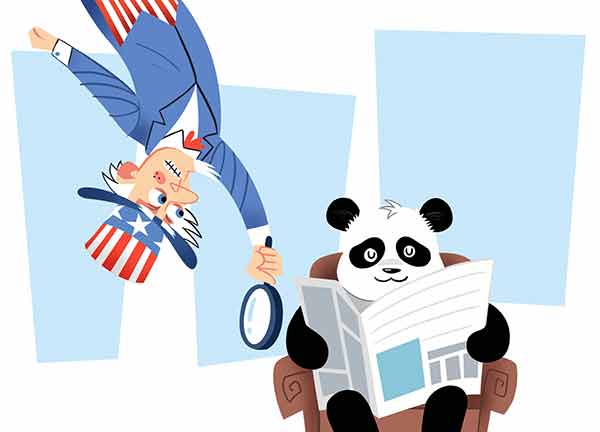Are Chinese media making US anxious?


The China-US trade dispute reveals the US administration's growing anxiety about China's rise, which in turn has triggered the anxiety of some of its Western allies. But some Chinese scholars speculate "China threat" fears have been fueled in the West, particularly in the United States, because Chinese media have presented an exaggeratedly positive, invincible image of China to the outside world.
Indeed, some Chinese media outlets should reflect on their exaggerated reports. But while such scholars' arguments are well intended, their speculation doesn't take into account the real and direct cause of the growing unsteady relations between the US and China since Donald Trump became US president.
China's confident and proactive strategy to engage with the world is appropriate, even justified, given the changing times and thus should be refined rather than halted or abandoned. So Chinese media should continue presenting China to the outside world as a positive global force, but in a more multi-varied manner.
In retrospect, Trump's visit to Asia from Nov 3 to Nov 14, 2017, presaged the beginning of the US administration's strategic shift from cooperation and competition to rivalry with China.
For example, a consultation report, "Sharp Power: Rising Authoritarian Influence", sponsored by the Washington-based National Endowment for Democracy and released on Dec 5, 2017, attempted to define China's soft power as "sharp power". In a sense, the authors of the report used "sharp power" as a new and more powerful concept than soft power, in order to label any attempt by China to engage with the world, be it cultural exchanges such as the Confucius Institutes, the Belt & Road Initiative or major country diplomacy, as malignant.
And the White House National Security Strategy Report, released in December last year, categorizes China as a "strategic rival" or "strategic competitor" of the US. A flurry of op-ed commentaries in US and European media ensued to bolster the official US stance toward China.
This public opinion campaign or US-style propaganda aimed at legitimizing the US move led to some ideologically biased politicians such as Senators Marco Rubio and Ted Cruz going against the very academic freedom they claim to value, by pressuring a couple of universities in their respective states of Florida and Texas to close down the Confucius Institutes.
In contrast, thanks to its collaborative, holistic and win-win ideology, China has been attempting to further develop its economy and thus help others do the same by aligning with the Belt the Road Initiative. In short, China wants to work with other countries to build a community of shared future for humankind.
This cooperative strategy of China will not only help change American culture from a culture of competition bordering violence to a culture of cooperation and collaboration, but also help alleviate those Chinese scholars' worries about deteriorating US-China relations.
The author is a professor at the School of Communication, Chapman University (US) and a research fellow at the National Academy of Development and Strategy (NADS), Renmin University of China.


































